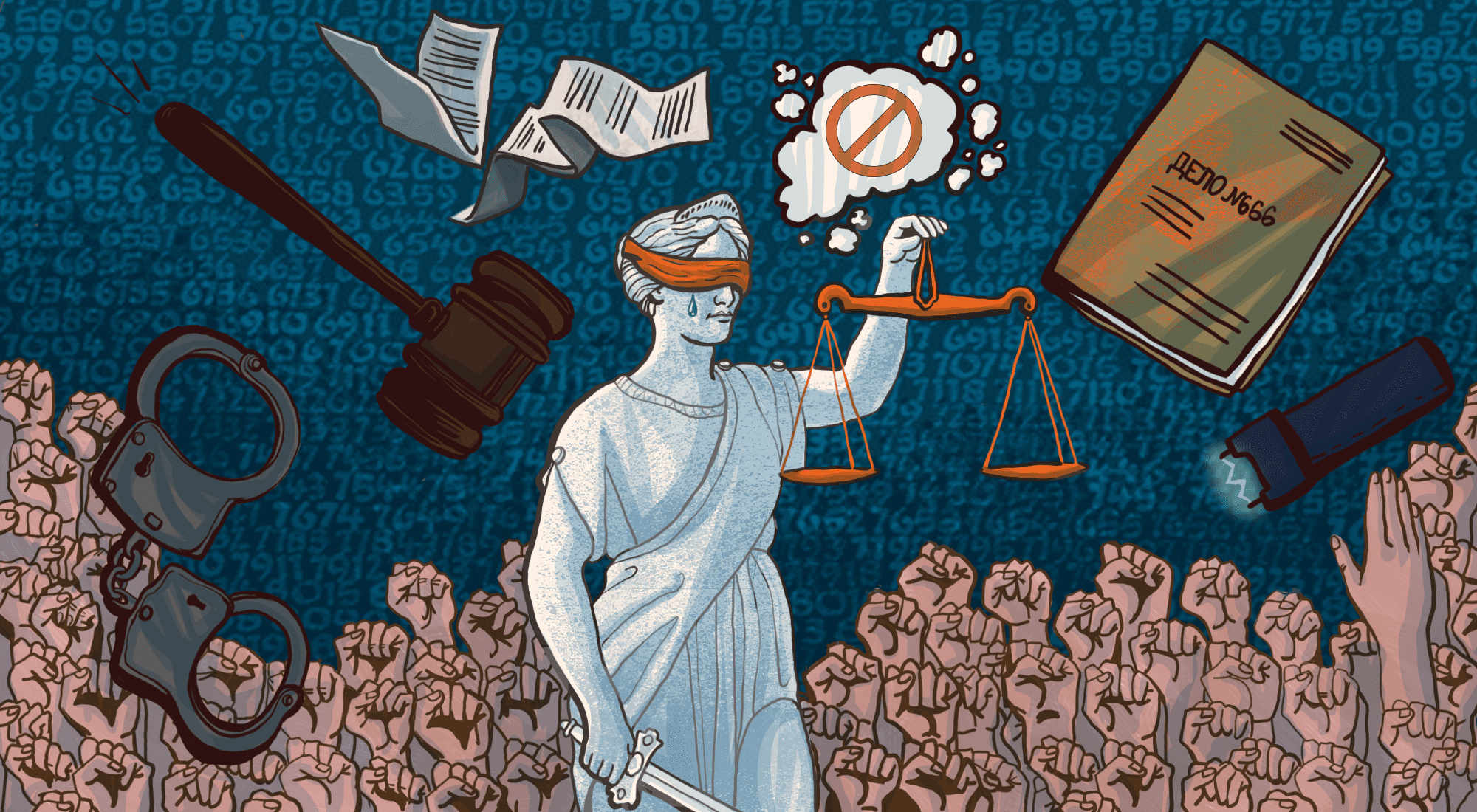
How many people in Russia are imprisoned for political reasons?
We monitor criminal cases initiated by Russian investigative authorities that contain, in our opinion, a political motive. Here you will find information about these cases, their visualization and tools for working with the data. The data in the database is updated daily, the charts are updated weekly. You can read more about which cases we consider politically motivated and what data you can find in the database here.
Data on persecuted persons
The charts show:
- the number of defendants subjected to politically motivated criminal prosecution;
- how the number of defendants changed by the year the persecution began (in those cases where it is known), starting from 2012.
By using the filters you can see, for example, the dynamics of cases filed against Jehovah’s Witnesses or the current location of all politically persecuted women.
-
DATA ON PERSECUTION CASES
OPEN— freedoms which people are persecuted for
— criminal articles
— rating by regions
-
ANTI-WAR CRIMINAL CASES
Read— data on persecuted defendants
— criminal articles
— location of defendants
— how to write them a letter
-
DATA ON SENTENCES
OPEN— types of sentences
— prison sentences
— fines and terms of imprisonment by categories
Frequently asked questions
-
How is the data updated? Why did the number become larger or smaller?
Every day we add defendants involved in criminal cases to the database. The charts are updated weekly. If a criminal case was initiated in 2022 and we learn about it just now (for example, because it just appeared on the court’s website), then the numbers for 2022 will change. The most up-to-date information is always on this page.
-
How do cases get into this Database?
The database includes criminal cases that OVD-Info considers politically motivated. You can read more in our methodology. We monitor various sources daily (court websites, Russian media news), and decide to include cases in the database based on the methodology and our definition of political persecution. Sometimes a political motive in a case does not immediately become obvious, and sometimes it turns out that there was none in a case. For such instances, we may add an archived case or remove a previously included one.
-
Are all the people in the Database considered political prisoners?
Political prisoners are those who are recognized as such by the Memorial organization in accordance with the Guidelines for the Definition of the Concept of «Political Prisoner» based on PACE Resolution No. 1900 (2012). Such ratings are indicated in the «Ratings» field in our database. Not all people in the database are political prisoners, but all of them are politically persecuted. Politically persecuted are persons who have become involved in politically motivated criminal cases, according to OVD-Info. This term is broader than «political prisoner». In Russia, a significant number of politically motivated criminal cases remain not covered by other organizations. Given the increasing scale of political persecution, it is important to paint the picture of repressions as wide as possible. Therefore, we use our own concept and calculation.
-
How to find out details about the defendants?
The database contains all the data we have on people who have been subjected to politically motivated criminal prosecution by the Russian authorities. If you click on the diagonal arrows at the beginning of a line, the respective record will expand to show all the details about the person and their case.
-
Where do we get our data from?
We receive information about cases of politically motivated persecution from various sources. Being not only a human rights advocacy project, but also a media project, OVD-Info carries out daily monitoring of the media and social networks, as well as the websites of Russian government agencies. In addition, information is provided to us by people who have directly faced political persecution and their relatives, as well as the lawyers who cooperate with us. We also use information from other human rights advocacy and research organizations working on similar topics.
-
GET MORE DATA
OPEN THE FORMOVD-Info documents repressions in Russia. To request data or for any other questions, please fill out the form
-
SUBSCRIBE TO NEWSLETTER
SUBSCRIBEWe have a newsletter for researchers and experts. We use it to share information about new reports, data, and datasets.
-
TELEGRAM CHANNEL
OPEN TELEGRAMWe have a telegram channel where we share the latest data and graphs (in Russian).
Data source
Each line contains details about one prosecution case of one person. It means that one line covers prosecution within a specific criminal case. Therefore, if there is more than one criminal case against a person, and these cases have not been consolidated, then there is more than one line (for instance, Alexei Navalny has eight lines!). When you click on the diagonal arrows at the beginning of a line, the respective record expands to show all the details about the person and the prosecution itself. For more information about the types of data you can find in the lines, read here.


